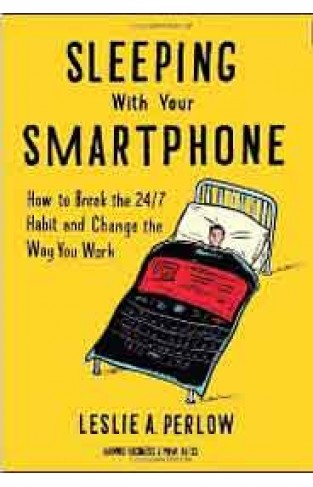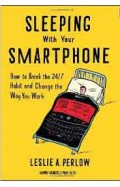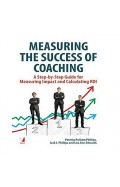- Home
- Categories
- Non Fiction
- Business & Management
- Sleeping with Your Smartphone How to Break the 247 Habit and Change the Way You Work
Sleeping with Your Smartphone How to Break the 247 Habit and Change the Way You Work
By: Leslie A Perlow
-
Rs 1,262.25
- Rs 2,295.00
- 45%
You save Rs 1,032.75.
Due to constant currency fluctuation, prices are subject to change with or without notice.
| Book | |
| What's in the Box? | 1 x Sleeping with Your Smartphone How to Break the 247 Habit and Change the Way You Work |
Sleeping with Your Smartphone How to Break the 247 Habit and Change the Way You Work
By: Leslie A Perlow
Rs 1,262.25 Rs 2,295.00 Ex Tax :Rs 1,262.25
Zubin Mehta: A Musical Journey (An Authorized Biography)
By: VOID - Bakhtiar K. Dadabhoy
Rs 472.50 Rs 1,050.00 Ex Tax :Rs 472.50
Selfienomics A Seriously Funny Guide to Living the Good Life
By: Revant Himatsingka
Rs 312.75 Rs 695.00 Ex Tax :Rs 312.75
Sleeping with Your Smartphone How to Break the 247 Habit and Change the Way You Work
By: Leslie A Perlow
Rs 1,262.25 Rs 2,295.00 Ex Tax :Rs 1,262.25
Transformative HR: How Great Companies Use Evidencebased Change for Sustainable Advantage
By: John Boudreau
Rs 1,312.50 Rs 1,750.00 Ex Tax :Rs 1,312.50
Measuring the Succeof Coaching A Step by Step Guide for Measuring Impact and Calculating
By: Patricia Pulliam Phillips
Rs 357.75 Rs 795.00 Ex Tax :Rs 357.75
Make it in India Global CEO Sindo US Insights
By: Ranjini Manian
Rs 222.75 Rs 495.00 Ex Tax :Rs 222.75
The Complete Guide To Mentoring: How to Design Implement and Evaluate Effective Mentoring Programmes
By: Hilarie Owen
Rs 1,537.25 Rs 2,795.00 Ex Tax :Rs 1,537.25
The Gifted Boss : How To Find Create And Keep Great Employees
By: Dale Dauten
Rs 582.75 Rs 1,295.00 Ex Tax :Rs 582.75
Side tracked Why Our Decisions Get Derailedand How We Can Stick to the Plan
By: Francesca Gino
Rs 3,957.25 Rs 7,195.00 Ex Tax :Rs 3,957.25
Selfienomics A Seriously Funny Guide to Living the Good Life
By: Revant Himatsingka
Rs 312.75 Rs 695.00 Ex Tax :Rs 312.75
No recently viewed books available at the moment.
Zubin Mehta: A Musical Journey (An Authorized Biography)
By: VOID - Bakhtiar K. Dadabhoy
Rs 472.50 Rs 1,050.00 Ex Tax :Rs 472.50
Sleeping with Your Smartphone How to Break the 247 Habit and Change the Way You Work
By: Leslie A Perlow
Rs 1,262.25 Rs 2,295.00 Ex Tax :Rs 1,262.25
Selfienomics A Seriously Funny Guide to Living the Good Life
By: Revant Himatsingka
Rs 312.75 Rs 695.00 Ex Tax :Rs 312.75














-120x187.jpg?q6)















